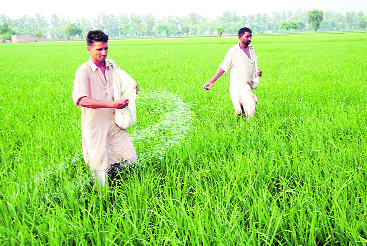General News
BARC reports “toxic metals”/ Uranium in fertilisers as firms avoid costly decontamination process
December 8, 2014 | By Bharat Khanna, Tribune News Service
Bathinda: The Bhabha Atomic Research Centre (BARC) has found high uranium content in diammonium phosphate and single superphosphate fertilisers that do not undergo the costlier decontamination process during production. The conclusion was reached after testing of soil and fertiliser samples.
The Environmental Assessment Division of BARC sent a report on samples of DAP (diammonium phosphate) and single superphosphate in March 2012. It tested soil samples taken from areas where these fertilisers were being used from the past thirty years. The samples were sent to BARC for testing by the Department of Soil and Science Punjab Agricultural University (PAU), Ludhiana. However, the report was not made public.
As per the report sent by BARC to PAU, uranium concentration was found 91.77 ppm in DAP and 2.92 ppm in single superphosphate.
Experts say uranium can be removed by adopting a decontamination process, but private companies producing fertilisers usually avoid this costly process.

BARC reports toxic metals in fertilisers as firms avoid costly decontamination process
NGO Kheti Virasat chairman Chandra Prakash, an assistant professor in environment science at Punjab Technical University, Kapurthala, said, “Due to the use of such fertilisers, uranium content enters the soil and then contaminates groundwater. The government should make it mandatory for fertiliser units to adopt decontamination process to remove uranium from the produce. Our next survey will cover Haryana, Rajasthan and Madhya Pradesh where farmers do not depend as much on pesticides and fertilisers as their counterparts in Punjab do. The people of Punjab are consuming the highest content of uranium. It has been a leading cause behind cancer cases. The heavy metal content found in Punjabis is 23 times more than Europeans.”
“Uranium is slightly radioactive in its natural state. But it is toxic for humans, especially when it gets into drinking water. It can affect blood, bones and kidneys. Children are more affected by uranium content in drinking water as their fluid intake is two to three times that of adults (relative to their body weight),” Chander Prakash said.
Agriculture Development Officer, PAU Regional Centre, Bathinda, Dr Dharampal Singh said, “There is no mention of the permissible limit for any heavy metal, including uranium, in fertilisers. These should not be present in fertilisers. I had never heard about the presence of uranium or such metals in fertilisers.”
Head of Soil Science Department, PAU, Dr Harmeet Singh said, “Yes BARC had sent us a report on the presence of uranium in fertilisers. However, there was nothing to worry about as the content was very less even in cases of prolonged use of DAP.”
PAU Vice-Chancellor Baldev Singh Dhillon said, “As per my knowledge, there is no such report. No such test has been conducted by the PAU. If uranium is present in fertilisers, it’s harmful. I will check it with the Department of Soil.”
NGO Kheti Virasat got tests conducted on cancer patients and found that toxic content was 23 times more in Punjabis than Europeans. Nail and hair samples of 49 cancer patients and 50 other persons were tested at Micro Trace Minerals Laboratory, Hersbruck, Germany.
In 2009, the Baba Farid Institute of Medical Science and Health, Faridkot, got similar tests conducted on mentally retarded children from the same laboratory. The survey was conducted in 12 villages of Bathinda and Muktsar, besides Faridkot city.
About 16 patients were taken from Faridkot city while six each were taken from Shekpur, Jhajjal and Giana villages and three each from Malkana and Bhagwanpura villages of Bathinda district. Patients were also selected from some other areas.
Above write-up was originally published by The Tribune (TT) at source url: http://www.tribuneindia.com/news/punjab/lethal-uranium-found-in-soil-samples/15624.html . It’s reproduced as above for the information of readers/ visitors of the Sikh Siyasat News.
To Get Sikh Siyasat News Alerts via WhatsApp:
(1) Save Our WhatsApp Number 0091-855-606-7689 to your phone contacts; and
(2) Send us Your Name via WhatsApp. Click Here to Send WhatsApp Message Now.
Sikh Siyasat is on Telegram Now. Subscribe to our Telegram Channel
Related Topics: Uranium in Punjab Waters




